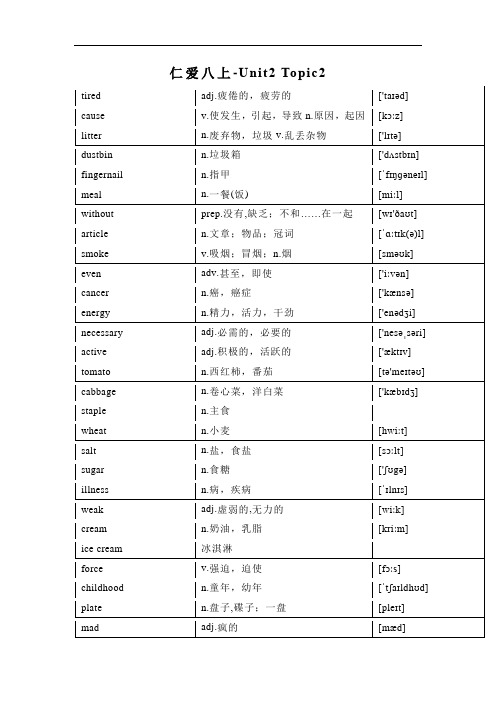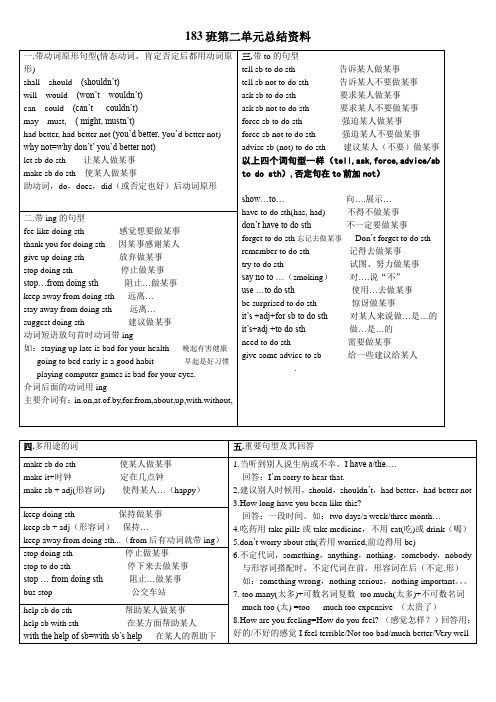仁爱八年级上unit2知识点总结
- 格式:doc
- 大小:61.00 KB
- 文档页数:8

仁爱八上-Unit2 Topic2知识梳理【重点短语】1.stay up late 熬夜到很晚2.do morning exercises 做早操3.throw litter around 到处乱扔垃圾4.read in the sun 在太阳下读书5.in the newspaper在报纸上6.give up doing sth.7.show sth. to sb.=show sb. sth.8.It’s +adj.+ for sb. to do sth.对某人来说做某事……9.be careful not to do sth.小心不要做某事10.force sb. to do sth.迫使某人做某事11.leave for sp. 前往某地12.as soon as…一……就……13.get/be mad 发疯14.be surprised to do sth. 惊奇于做某事15.in fact 事实上16.as soon as possible 尽可能快的【重点句型】1.Staying up late is bad for your health.熬夜到很晚对你的健康有害。
2.I must have a good rest.我一定要好好休息。
3.You’d better not read in the sun.你最好不要在太阳下读书。
4.I must ask him to give up smoking.我一定让他放弃抽烟。
5.He thinks smoking can help him relax.他认为抽烟可以帮他放松。
6.It may even cause cancer.它甚至导致癌症。
7.May I borrow your newspaper and show it to my father? 我可以借你的报纸给我爸爸看看吗?8.How terrible!多么糟糕呀!9.It’s bad for your health.这对你健康有害。

基础义务教育资料Unit2Keeping Healthy Topic1You should see a dentist.一.重要词组:Hook well/pale看起来挺好/看起脸色苍白2have a cold/a fever/a cough/a toothache/a back headache/a stomachache感冒/发烧/咳嗽/牙痛/背痛/胃痛3have the flu得了流感4have sore eyes眼睛疼5be sorry to do sth.做某事很抱歉6.boiled water开水7.plenty of=a lot of=lots of=many=much许多、大量8.stay in bed卧床9.have a good sleep好好睡一觉10.r ead in the sun在太阳下看书11.feel terrible感觉难受12.t ake some medicine/pills吃些药/药片13.t ake sb.to sp.把某人带到某地14.d ay and night日日夜夜15.feel like doing sth=want to do sth想要做某事16.g o to see a doctor/dentist去看医生/牙医17.h ave a (good)rest=take a(good)rest(好好)休息18.lie down躺下19.h otfood辛辣的食物20.t oo much candy太多糖果too many cakes太多蛋糕21.b rush one,s teeth刷牙take care of=look after照顾、照看22.take good care of=look after well好好照顾23.something new一些新的东西24.g o up上升25.fall down摔倒26.r un to sb.跑向某人run into sb,撞上某人27.with a cry/smile带着哭腔/微笑28.nothing serious没什么严重的29.r eturn to school重返校园30.t hree times a day一天3次31.h elp sb.(to)do sth.帮助某人做某事32.feel much better感觉好多了33.ask for one week,s leave(n.)请一周的假34.t hank sb.for sth.为某事感谢某人35.w orry about=be worried about为...担心36.follow the doctor,s advice/suggestions听从医生的建议37.g et well变好了,好转了38.h ave an accident发生事故39.d o sth.too much经常做某事40.n eed to do sth.需要做某事二.重要句型:IWhat,s wrong with you?=What,s the matter with you?你怎么了?21'm sorry to hear that.听到这件事我感到很抱歉。


仁爱版八年级上册unit2知识点Unit2的主要内容是介绍日常生活中的一些常用词汇和短语,包括人物描述、衣着打扮和日常生活活动的表达。
下面我们将列出每个小节的知识点。
第一小节:人物描述
1.外貌特征
a.眼睛:big/small/dark/light/brown/blue/green
b.头发:long/short/black/blonde/brown
c.身高:tall/short
d.体重:thin/heavy
2.性格描述
a.开朗:outgoing/friendly
b.安静:quiet/shy
c.勇敢:brave
d.有礼貌:polite
第二小节:衣着打扮
1.上衣:T-shirt/sweater/shirt/blouse
2.裤子:jeans/pants/shorts
3.鞋子:sneakers/sandals/boots
4.配饰:necklace/bracelet/watch/earrings 第三小节:日常活动表达
1. 问路:Excuse me, can you tell me the way to...?
2. 看病:I feel sick. I need to see a doctor.
3. 看电影:Would you like to go to the movies with me?
4. 离开:Goodbye. Have a nice day.
本节重点:
1.掌握常用词汇和短语。
2.熟练应用词汇和短语,能够写出相关的句子和话题。
3.通过看图、听音等多种方式让学生掌握所学内容。
通过本节学习,学生可以扩展自己的词汇量和日常表达能力,从而达到更好的交流效果。

Unit 2Topic2 知识梳理一.重点单词with (prep.) ——without(反义词) smoke(v.)——smoker (n.)act(v.)——active(adj.)——activity(n.) tomato (n.)——tomatoes (pl.)ill(adj.)——illness (n.) child (n.)——children (pl.) ——childhood (n.) surprise (n./v.)——surprised (adj.) potato(n.)——potatoes (pl.)health(n.)——healthy(adj.)——unhealthy(adj.) possible(adj.)——impossible (反义词) 二·词组Section A1.look tired 看起来累的2.watch a soccer game on TV 在电视上看足球赛3.stay up late 熬夜4.be bad for… 对… 有坏处st night 昨晚上6.read in the sun 在太阳下看书7.put litter into the dustbin 把垃圾放进垃圾箱8.do morning exercises 做早操9.throw litter around 到处乱扔垃圾10. go to bed late 迟睡觉11.get up early 早起12. keep fingernails long 留长指甲12.wash hands before meals 餐前洗手13.play sports right after meals 饭后就运动14.go to school without breakfast 不吃早饭去上学Section B15.an article about smoking 一篇关于吸烟的文章16.cause cancer 致癌17.give up sth./doing sth. 放弃某事/做谋事18.help sb. relax 帮助某人放松19.show sth to sb.=show sb. sth. 把某物给某人看20.give you energy 给你能量21.be necessary for 对……有必要22.keep you active 保持活力23.take a walk 散步Section C24.be careful (not) to do sth… 小心(不)要做做谋事25.cause illness/diseases 引发疾病26.take care of sb. well= take good care of sb.照顾好某人27.force sb. to do sth. 强迫某人做谋事28.during one’s childhood 在某人童年时期29.make sb. do sth. 使某人做谋事30.get mad 生气31.be surprised to do sth. 做谋事感到很吃惊32.as soon as… 一…就…33.during his childhood 在他的童年期间34.by chance 偶然地Section D35.as soon as possible 尽快36.not only… but (also)… 不仅…而且…37.tell sb. (not) to do sth. 告诉某人(不)要做谋事38.in fact 实际上,事实上三.重点句子1. I’m sorry to hear that. 听到这个我感到很抱歉。

仁爱版英语八年级上册unit2知识点仁爱版英语八年级上册unit2教学内容主要包括三个方面: 一、词汇;二、语法;三、句型。
一、词汇1. 颜色:红色 red, 黄色 yellow, 蓝色 blue, 黑色 black, 白色 white, 紫色 purple, 绿色 green, 橙色 orange, 粉红色 pink。
2. 衣着:帽子 hat, 外套 coat, 衬衫 shirt, 裤子 trousers/pants, 鞋shoes, 裙子 skirt, T恤 T-shirt, 运动服 tracksuit。
3. 食物:饼干 biscuit, 蛋糕 cake, 冰淇淋 ice cream, 汉堡包hamburger, 薯条 chips,面包 bread, 牛奶 milk, 面条 noodles, 炸鸡fried chicken。
4. 学科:地理 geography, 历史 history, 数学 maths, 音乐 music, 物理 physics, 外语 foreign language, 文学 literature。
二、语法1. 一般现在时:肯定句:主语+动词原形+s/es,如 He likes playing basketball.否定句:主语+does not/do not+动词原形,如 He does not like watching TV.疑问句:Does/Do+主语+动词原形?如 Does he like playing basketball?2. 连词and 表示并列,如 He is tall and handsome.or 表示选择,如 Would you like coffee or tea?but 表示转折,如 He is not rich but happy.3. 物主代词:my 我的, your 你的, his 他的, her 她的, its 它的, our 我们的, your 你们的, their 他们的。
本文由一线教师精心整理/word可编辑八年级上册Unit 2 topic 2I must ask him to give up smoking.Section A※重点短语集锦1.look tired 看起来很累2.watch a soccer game on TV在电视上观看一场足球赛3.stay up ( late ) 熬夜4.go to bed late 晚睡5.be bad/good for…对……有害/益6.do morning/eye exercises 做早操/眼保健操7.do exercise=do/play sports 做运动/锻炼8.Put into 投入9.throw around 乱扔10. keep fingernails long 留长指甲11. play sports right 进行适当的体育锻炼12. go to school without breakfast不吃早餐去上学※重要知识点讲解1. What’s wrong? = What’s up?= What’s happening ? = What’s the matter/trouble? 怎么了?2. Staying up late is bad for your health.(1) stay up = sit up熬夜, 如:we stayed up until midnight to see the New Year coming.(2) 动词ing形式(动名词)可直接放句首作主语,谓语动词用单三形式。
3.I am sorry to hear that.听到这我感到很难过。
这是表示同情的一种说法。
当你听到别人不幸的事情时,应说此句用来表示你的同情。
4.on TV/the phone“(通过)电视/电话”,或直接译成“在电视上/电话上”。
5.I see.我明白了。
此句为口语,在这里see指“明白,理解”之意。
Unit2 Keeping healthyTopic2 I must ask him to give up smoking.Section A1.What’s up?= What’s happening ? = What’swrong? = What’s the matter/trouble? 怎么了?2. Staying up late is bad foryour health.(1) stay up = sit up熬夜, 如:We stayed up until midnight to see the New Year coming. (2) 动词ing形式(动名词)可直接放句首作主语,谓语动词用单三形式。
3. too little 太少; too much 太多;都用来修饰不可数名词。
4. going to school without breakfast 不吃早饭去上学。
Section B1. You must not read in the sun.in the sun 在阳光下(此处不能用under the sun )2. I must ask him to give up smoking.give up doing sth. = stop doing sth. 放弃做某事3. Don’t throw litter about.throw about 到处扔,如:throw litter about= throw about litter (litter是名词,即可以放后也可以放中间,但代词只能放中间,如:throw it about )4. go for a walk 去散步; take a walk = have a walk 散步5. It will keep you active during the day.(1)keep + 宾语+ 补语(补语可以是:动词ing 形式;形容词;介词短语)①I’m sorry to keep you waiting for sucha long time. (keep sb. doing sth.使某人一直做某事 )②Keep the door open, please. (keep sb/sth+形容词表示某人/某事物保持怎样的状态)③Once a cold keep the child in bed forthree days (keep sb+介词短语表示某人呆在某地)(2) during the day = in the daytime 在白天Section C1. It may show that something is wrongwith your health.(1) show sb. sth. = show sth. to sb. 向某人展示某物 please show me your new book.(2) show sb. around 某地表带某人参观某地:I’ll show you around our schooltomorrow.2. You can get a headache when you exercise onan empty stomach.on an empty stomach 空腹3. We can get into the human body throughthe nose.(1) get into 进入,陷入; 如:get into trouble 陷入麻烦(2)①through 从物体内部穿过,如:walk through a forest.②across 从物体表面横穿,如:go across the road③ over 从物体上空越过, 如:fly over the city4. The boy has an illness.illness = sickness疾病(名词),很少表示具体的疾病,只表示抽象的疾病,disease 常表某种疾病。
Section A1.看起来很疲惫look tired2.看一场足球赛watch a soccer game3.在电视上on TV4.熬夜很晚stay up late5.对…有害be bad for6.感觉更好feel better7.吃太多eat too much8.在阳光下看书read in the sun9.把垃圾放入垃圾箱put litter into the dustbin10.做早操do morning exercises11.做眼保健操do eye exercises12.乱扔垃圾throw litter around13.刷牙brush teeth14.运动play sports15.留长指甲keep fingernails long16.饭后(right) after meals17.不吃早餐上学go to school without breakfast18.你(不)应该You should/shouldn’t do…19.你必须/你不可以You must/mustn’t do…20.不要/不许… Don’t do…Section B1.读一篇关于吸烟的文章read an article about smoking2.在报纸上in the newspaper3.引发癌症cause cancer4.放弃(做)某事give up (doing) sth.5.给你能量、精力give you energy6.对…是有必要的be necessary for7.使某人保持活力keep you active8.在白天during the day9.喝足够的水drink enough water10.去散步take a walk=go for a walk11.在周末on weekends12.学到深夜study late into night13.在白天during the day14.洗澡have a bath=take a bath(多指盆浴)have a shower=take a shower(多指淋浴)15.呼吸新鲜空气take a fresh breath16.早睡早起。
仁爱版八年级(上)英语Unit 2 Topic2Section C and Section D一、重点词组1 . hurry up ____________2 . go ahead ____________3 . take one’s advice ____________4 . all the time ____________5 . keep away from ____________6 . right now ____________7 . ring sb up ____________ 8 . leave a message ____________9上网____________ 11.拥挤的地方____________二、重点语法及句型:1. must 与have to的区别:1)must着重说明主观看法,而have to比较强调客观需要。
例如:We must study hard. 我们必须努力学习。
There was no bus, so they had to walk home.没有公共汽车了,因此,他们只好走路回家。
2)have to可以用于更多时态。
例如:We had to be there at ten. 我们得在10点钟到达那里。
We’ll have to do it again. 我们将不得不重做一次。
2.prevent sb(from)doing sth .在被动语态中from不能省略。
3.在含有must的一般疑问句中,肯定回答用must,否定回答mustn't,而用needn't , don't have to.4.Keep away from 远离-------,后接名词、代词或动名词。
Keep-------away from 让---远离---5. spread v. 传播。
例如:The news soon spread through the town. 消息很快传遍了全城。
Unit 2 Topic 1一、重点短语1.have a cold/a toothache /a fever/a cough/a backache/a stomachache/a sore throat/the flu /sore eyes感冒/牙疼/发烧/咳嗽/背疼胃疼/咽喉发炎/流感/眼疼2.take a rest=have a rest 休息3.not read for too long 不要看书太久4.boiled water 开水5.stay in bed 卧病在床,躺在床上6.have a good sleep 好好睡一觉7.feel terrible 感觉难受8.day and night 日日夜夜9.You'd better=You had better 你最好-------10.not so well 很不好11.not too bad 没什么大碍12.much better 好多了13.go to see a doctor 去看病14.take /have some medicine 吃药15.take------to----- 把--------带到--------16.send------to------- 把-------送到-------17.hot tea with honey 加蜂蜜的热茶18.lie down 躺下19.look after=take care of 照看,照顾20.brush teeth 刷牙21.have an accident 发生一次意外/事故22.don't worry 别担心23.worry about 担心--------24.nothing serious 没什么严重,没什么大碍25.check over 诊断,仔细检查26.thank you for------------ 因--------而感谢你27.buy------for---- 为------买------28.not------until---- 直到-------才----29.ice cream 冰淇淋30.both----and--- ------和-------都是----31.take some cold pills 吃感冒药32.plenty of 许多,大量二、重点句型1. What's wrong with you/him/her?你/他/她怎么了?同一句:What's the matter with-------?What's the trouble with------?2.You should see a dentist.你应该去看牙医。
这是一种表达建议的句子。
还可以用以下句式: you'd better(not)-------how /what about--------why not/don't you --------3.I'm sorry to hear that.听到这个消息我很难过。
这是表示同情别人的句子。
4.You look pale.你看起来很苍白。
(1)在英语中表示气色不好,苍白,不用whit,而用pale(2)“look ”在这里译作“看起来”,作连系动词,后接形容词。
如:You look beautiful。
你看起来很漂亮.与look用法相同的连系动词还有 taste ,sound ,smell ,feel 。
如:The soup tastes very delicious .这汤尝起来真香。
Your voice sound nice.你的声音听起来很动人。
The flowers smell sweet .这些花闻起来很香。
The silk feels smooth 丝绸摸起来很光滑。
5.------Shall I take you to the hospital?我送你去医院吧?-------No, thank you.不用,谢谢。
Shall I do----需要我做-------吗?take sb.to-----------把某人送到某地6. I'll take some medicine and see how it goes. 我打算先吃药看看情况再说。
“goes”在这里指事情的进展。
“it ”用来代指病情。
如:How is everything going?一切进展如何?Everything is going well.一切进展顺利。
7.You'd better drink hot tea with honey.你最好喝加蜂蜜的热茶。
tea with honey 加了蜂蜜的茶,with表示一种伴随状态。
类似的表达还有:some coffee with sugar and milk加了牛奶和糖的咖啡some tea without sugar不加糖的茶8.Michael had an accident yesterday.昨天迈克发生了事故。
had an accident发生了事故9.But my left leg still hurts when I move it.可是当我挪动脚时,还是有点儿疼。
句中“hurt”译为“疼痛”,作不及物动词。
后不可接宾语。
如:my head hurts.10.Your X-rays show it's nothing serious.你的X光照片显示没什么严重的问题。
nothing serious 没什么严重的。
nothing ,something ,anything等不定代词,被形容词修饰时,形容词位于其后。
如:I have something important to say.我有一些重要的事情要说。
11.Stay in bed and don't move your leg too much.躺在床上,不要总是挪动你的腿。
12.Michael's friends bought some chocolate for him .迈克的朋友给他买饿一些巧克力。
buy sth for sb.双宾语的运用。
使用双宾语时,在人宾前需要使用介词,有时用“to”有时用“for ”,这与动词本身有关,表示动词的方向,多用“to”,表示动词的目的,多用“ for ”give sth to sb. pass sth to sb.bring sth to sb. take sth to sb.cook sth for sb. buy sth for to sb .13.------but I couldn't read them until today.但是直到今天我才读了它们。
not ----until直到------才-------until 在肯定句动词一般用延续性动词,在否定句中动词一般为短暂性动词。
如:He will wait for his father until ten o'clock.他将等他父亲一直到10点钟。
He won't leave until his father comes.他直到他父亲回来才离开。
三、语法学习1、had better 的形式和用法1)固定短语had better具有情态意义,也可以看作情态动词。
译为“最好”,它只有一种形式,没有人称和数的变化,后常跟动词原形,是给人提出建议的一种方式。
如:You had better go to see the doctor你最好去看医生。
You'd better eat a lot of fruit and drink plenty of water.你最好多吃水果,多喝水。
2)Had better的否定结构为 had better not。
如:You'd better not eat hot food你最好别吃辛辣的食物。
You'd better not work today.你今天最好别工作。
2、shall的用法1)作助动词时,英式英语中表示将来,可与第一人称连用,但在口语中所有人称都用will。
如:this time next week Ishall/will be in New York.下周这个时候我就在纽约了。
拄:美语则不管什么人称,一律用will。
2)作情态动词时表征询意见,用于第一人称的疑问句中。
如:Shall Itake you to the hospital?要不要我带你去医院?What shall we do this weekend?这个周末我们要作什么呢?Topic 2一、重点短语1.stay up late熬夜2.be bad for对------有害3.be good for对------有益4.too much太多,过分5.do morning exercises做早操6.keep long fingernails长长指甲7.play sports right进行适当的体育锻炼8.go to school without breakfast不吃早餐去上学9.have a bath洗澡10.take a fresh breath呼吸新鲜空气11.read ----about---读关于-------12.Ren'ai English Post仁爱英语报13.ask sb to do叫某人做某事14.give up放弃15.read in the sun在太阳底下看书16.throw litter about乱扔垃圾17.on the lawn在草坪上18.put------into------把-------放进-----19.exercise on an empty stomach空腹锻炼20.get into进入21.keep the air clean and fresh保持空气清新22.wash hands before meals饭前洗手23.potato chips炸薯条二、重点句型1.Staying up late is bad for your health.熬夜有害健康。
1)stay up late熬夜2)be bad for对--------有害。
类似的短语还有: be good for---对------有好处3)staying up late is---动名词作主语。
当我们需要一个动词充当主语时,常用此动词的动名词(即doing)形式。
如:Playing basketball is good for your heath.打篮球对你的身体有好处。
Reading in bed is bad for your eyes.躺在床上看书对眼睛有害。
Swimming is my hobby.游泳是我的爱好。
2.It will keep you active during the day.它会使你在白天保持活力。